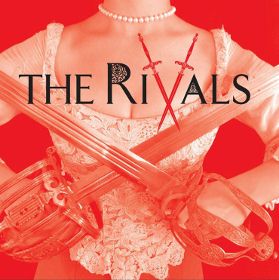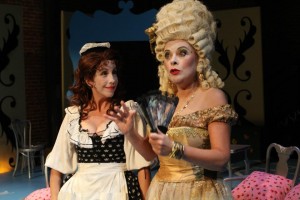THE SHTICK MAY DETRACT FROM THE PLAY, BUT JUST TRY TO RIVAL THE ACTORS’ GANG
The Rivals (1775), Richard Brinsley Sheridan’s wonderful Comedy of Manners, is a play about pretension; everyone in the work is pretending to be better in station or morality than they actually are—from a military officer who mimics being a sexy young stud to a harridan who fakes being learned (but who ends up spewing out wrong words at the wrong time).
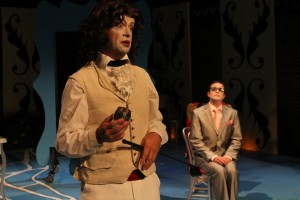 The play is of an era whose playwrights were reacting against a tradition of sentimentality and maudlinism in the theater. As a result, The Rivals is a comedy which wears its cynicism on its sleeve, in the same way that its heroes dandle handkerchiefs and wear floppy wigs. Wit is of paramount importance in this sort of show, and, to its credit, director David Schweizer’s glimmering production—almost too hip and sassy for the Post Restoration Era—crackles with clever stagecraft and amusing excesses.
The play is of an era whose playwrights were reacting against a tradition of sentimentality and maudlinism in the theater. As a result, The Rivals is a comedy which wears its cynicism on its sleeve, in the same way that its heroes dandle handkerchiefs and wear floppy wigs. Wit is of paramount importance in this sort of show, and, to its credit, director David Schweizer’s glimmering production—almost too hip and sassy for the Post Restoration Era—crackles with clever stagecraft and amusing excesses.
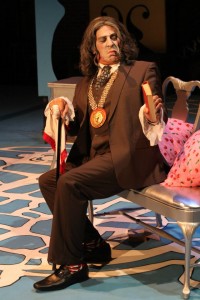 In 18th century Bath, a group of cheerful fops and toffs engage in trivial silliness in the pursuit of love and fortune. So as to woo lovely (if dimwitted) Lydia Languish (Alison Janes), lecherous Captain Jack Absolute (Brian Finney) pretends to be a buck private, the better to play into Lydia’s romantic notions of being wooed by a hot young soldier. However, unknown to Jack, his own father, pompous Sir Anthony (VJ Foster, a stand out performance, full of wondrous Restoration leers and sneers) has come to town, intent on marrying off his son to a certain wealthy heiress. Jack doesn’t want any of it, of course, but he doesn’t realize that the gal Sir Anthony is proposing to hitch him to is none other than Lydia—and Sir Anthony doesn’t know Jack already loves Lydia. And Lydia doesn’t know Jack is a Captain. To navigate all this pleasantly contrived madness, the characters must negotiate between and around Lydia’s guardian, the intractable Mrs. Maloprop (a hilariously braying Patti Tippo), the wrong-word spouting duenna misery who is one of the greatest characters in the history of the theater.
In 18th century Bath, a group of cheerful fops and toffs engage in trivial silliness in the pursuit of love and fortune. So as to woo lovely (if dimwitted) Lydia Languish (Alison Janes), lecherous Captain Jack Absolute (Brian Finney) pretends to be a buck private, the better to play into Lydia’s romantic notions of being wooed by a hot young soldier. However, unknown to Jack, his own father, pompous Sir Anthony (VJ Foster, a stand out performance, full of wondrous Restoration leers and sneers) has come to town, intent on marrying off his son to a certain wealthy heiress. Jack doesn’t want any of it, of course, but he doesn’t realize that the gal Sir Anthony is proposing to hitch him to is none other than Lydia—and Sir Anthony doesn’t know Jack already loves Lydia. And Lydia doesn’t know Jack is a Captain. To navigate all this pleasantly contrived madness, the characters must negotiate between and around Lydia’s guardian, the intractable Mrs. Maloprop (a hilariously braying Patti Tippo), the wrong-word spouting duenna misery who is one of the greatest characters in the history of the theater.
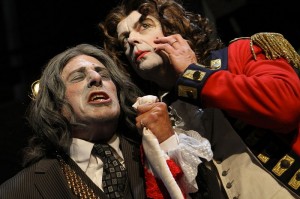 Schweizer’s staging of this mayhem very occasionally glitters with cheerful visual excess, thanks to a great extent to Christina Wright’s deliciously kitschy costumes, which combine the floppy wigs of King George with the swinging, gold lamé gowns and suits of Liberace-era Las Vegas. The traditional mugging and stylized behavior of Restoration-style comedy fits in extremely nicely with the trademark Actors’ Gang style and the stage simmers with gaping mouths, bugging eyes, and upturned, beaky noses. And the blocking is as clockwork perfect as one would expect from this company—each gesture is precisely, acrobatically executed. The production is a shrewd example of good old fashioned Clowning.
Schweizer’s staging of this mayhem very occasionally glitters with cheerful visual excess, thanks to a great extent to Christina Wright’s deliciously kitschy costumes, which combine the floppy wigs of King George with the swinging, gold lamé gowns and suits of Liberace-era Las Vegas. The traditional mugging and stylized behavior of Restoration-style comedy fits in extremely nicely with the trademark Actors’ Gang style and the stage simmers with gaping mouths, bugging eyes, and upturned, beaky noses. And the blocking is as clockwork perfect as one would expect from this company—each gesture is precisely, acrobatically executed. The production is a shrewd example of good old fashioned Clowning.
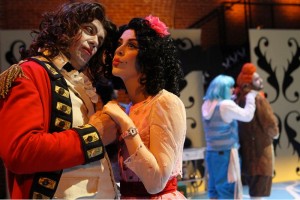 And, yet, the viewer is aware somehow that Schweizer and company don’t seem to trust the text, instead trying to distract attention via shtick and gag from the actual play almost every chance they get. For all the focus on the show’s technical aspects, the piece lacks warmth. Yes, that may be a conscious decision on the part of director and cast—and keeping within the idea of an anti-sentimental presentation of the play. But there’s room for some more subtle emotion here, too, and the romantic scenes (perhaps intentionally) never ring true or convincing.
And, yet, the viewer is aware somehow that Schweizer and company don’t seem to trust the text, instead trying to distract attention via shtick and gag from the actual play almost every chance they get. For all the focus on the show’s technical aspects, the piece lacks warmth. Yes, that may be a conscious decision on the part of director and cast—and keeping within the idea of an anti-sentimental presentation of the play. But there’s room for some more subtle emotion here, too, and the romantic scenes (perhaps intentionally) never ring true or convincing.
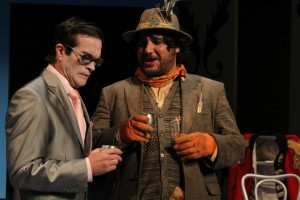 That isn’t to say there isn’t quite a lot to savor, as the performances hit a delightfully droll grotesque note, from Foster’s almost horrifyingly glowering and leering Sir Anthony—so chiseled you’ll almost think you’re watching a Notre Dame Cathedral gargoyle come to life—to Tippo’s hilariously tacky Mrs. Malaprop, who gloatingly struts like an arrogant peacock. Brian Finney is an interesting, anti-charismatic choice for the play’s romantic lead, Captain Jack. He’s alternately overweening and neurotic, and when he’s under threat (which happens quickly in Sheridan’s world), his face becomes a rictus of horror that puts one in mind of Herman Munster on a dark day at Mockingbird Lane. He’s a counter-intuitive choice for the supposedly sexy character—but he’s also quite quirkily funny.
That isn’t to say there isn’t quite a lot to savor, as the performances hit a delightfully droll grotesque note, from Foster’s almost horrifyingly glowering and leering Sir Anthony—so chiseled you’ll almost think you’re watching a Notre Dame Cathedral gargoyle come to life—to Tippo’s hilariously tacky Mrs. Malaprop, who gloatingly struts like an arrogant peacock. Brian Finney is an interesting, anti-charismatic choice for the play’s romantic lead, Captain Jack. He’s alternately overweening and neurotic, and when he’s under threat (which happens quickly in Sheridan’s world), his face becomes a rictus of horror that puts one in mind of Herman Munster on a dark day at Mockingbird Lane. He’s a counter-intuitive choice for the supposedly sexy character—but he’s also quite quirkily funny.
The ultimate issue, then, one supposes, is that the clockwork-like staging gives the work a mechanical feel that somehow prevents it from reaching comic heights that it would if the play were ironically just performed without frills. The play hits its marks, but never actually sends you rolling in the aisles with laughter. Which is a pity.
photos by Jean-Louis Darville
The Rivals
The Actors’ Gang at Ivy Substation in Culver City
scheduled to end on November 17, 2012
for tickets, call (310) 838-4264 or visit http://www.theactorsgang.com
